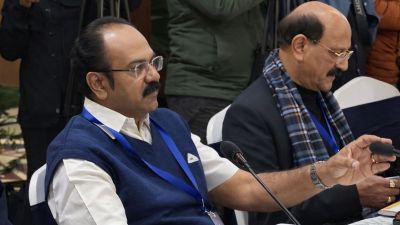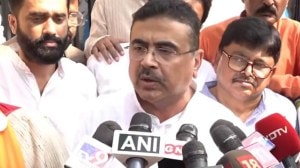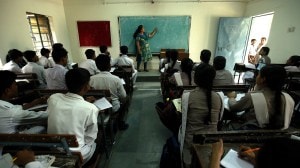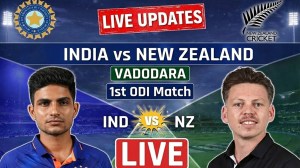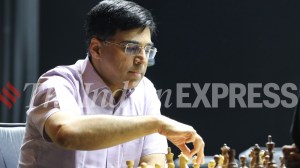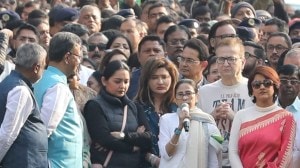Vote Vajpayee
The BJP-led coalition was united on two occasions: when it won the vote of confidence in March 1998 and when it lost the vote of confiden...

The BJP-led coalition was united on two occasions: when it won the vote of confidence in March 1998 and when it lost the vote of confidence in April 1999. In between, the partners bickered and quarreled among themselves, giving the country the least cohesive and most amusing government it has ever seen.
The Congress, on the other hand, demonstrated through Black Week April 17-24 how much it has still to learn about coalition politics. It let feckless associates lead it by the nose and showed itself astonishingly naive in trusting foes-turned-friends. In the event, it was more upon potential allies like Harkishen Surjeet than upon its own experience or good judgment that reliance was placed to cobble together the alternative government. That government never came into being. Elections are, therefore, upon us. In consequence, the Congress goes to the hustings with the goodwill built over the past year dissipated in disturbing measure and its image seriously dented.
Once the election campaign getsunderway, however, the question is going to be insistently asked: how will the same 18-party coalition, that plunged the country into so much instability on its first outing, assure stability to the country on its second? The BJP alliance will, of course, answer that it will 8212; because Jayalalitha has been replaced by Karunanidhi. The electorate will thus be invited to forget the disputes that erupted between the Akali Dal and the BJP, the Samata Party and the BJP, the Lok Shakti and the BJP, the BJD and the BJP, and the Trinamul Congress and the BJP, besides the rows within the Akali Dal, within the BJD, within the Samata, and with outside supporters like the TDP and the AGP, not to mention the volcanic rows between the Shiv Sena and the BJP and, most important, between the BJP and the Sangh Parivar. What assurance is there against the background of the lived experience of the coalition8217;s 13 turbulent months that 17-plus-DMK will somehow prove more stable than 17-plus-AIADMK?
The Congress, on the otherhand, is going into the elections without those who were supposed to have put together the alternative government. Some might find a berth on the Congress ship 8212; the RJD, the AIADMK are among those being mentioned. But any outcome that brings the Congress to office will leave it far less vulnerable to its poll partners than the BJP will be dependent on the behemoth it has put together. If the BJP-led alliance wins, the country is guaranteed another election early in the next millennium. If the Congress wins, it is likely to prolong to a full Golden Jubilee its post-Independence record of 45 years of stable governance, always and invariably completing its term every time it has been elected to office.
After all, the same Jayalalitha who caused so much heartache to the BJP was in alliance with the Congress in 1991, but whatever the rumpus between her and the Moopanar faction of the Congress in Tamil Nadu, the Congress leadership in Delhi knew how to keep her contained. She did not abandon the Congressbecause she was not betrayed as she was by the BJP 8212; which went back on every promise they made her in December 1997 to claim her as their first pre-poll ally to forge their Coalition with a Difference. She went along with them only after making clear her political priorities 8212; hounding out the DMK government and ensuring implementation of the Cauvery Tribunal8217;s seven-year-old interim award. To these political as distinct from private or personal demands was added the demand for investigations into a possible ISI-DMK nexus in the bomb blasts in Coimbatore, which were the proximate cause of the upset win the AIADMK-BJP combine scored over the DMK-TMC.
If the BJP found it impossible to manage their relationship with her, it was because they insistently portrayed her not as a political personality making political demands but as a fugitive from justice seeking to save her skin. On this personal matter, they were ostentatiously cooperative with the AIADMK, even to the extent of transferring officers likeBezbaruah whom she had not asked to be transferred. Indeed, the meretricious manner adopted to accommodate her problems with the law were expressly designed to lower her personal standing in the public so as to reduce the threat to the BJP from her political demands.
When it came to the political demands, far from discommoding the DMK government in any way, the BJP at the Centre treated the state government of Tamil Nadu differentially to their treatment of the state government of Bihar. And deferentially over the Coimbatore bomb blasts. The DMK has neither been investigated over its astonishing complacency in regard to reports of ISI infiltration into Tamil Nadu months before the bombs went off in Coimbatore, nor even into its links with the LTTE as promised by Advani in the Action Taken Report on the Jain Commission. Worse, Vajpayee did not deign to take any cognizance of her cogent and well-argued complaints over the bogus outrage the toothless Cauvery Authority has proved to be. And when within threedays of the dismissal of Admiral Bhagwat, she became the first political personality in the country to voice her anxiety over the national security implications, her statement of January 2 was dismissed by the prime minister as the ravings of a demented opponent, not the concerns of his single most important ally.
Thus it was that the Jayalalitha who powered Vajpayee to Race Course Road progressively became his Achilles heel. By April this year, she had been projected within the alliance and to the country at large as a criminal seeking refuge in the bosom of the BJP-led alliance, not the singular cause of the BJP forming the government in the first place. It was this that drove her to withdraw her support from the government she, more than anyone else, had brought into being. Moreover, the rift valleys that opened within the ranks of the 18-party alliance were neither uniquely related to Jayalalitha, nor have ended with her withdrawal. They have plagued the principal party and its support base in evengreater measure.
None of this will change merely because Jayalalitha has been replaced by Karunanidhi. The electoral alliance the BJP is fielding is, bar one change, the same incoherent, unwieldy mess that made a 13-month mess of governance. They will assuredly do the same again. The Congress, on the other hand, will be the dominant, non-dependent leader of any partners it chooses to go with into the forthcoming elections. The choice before the electorate will thus be between the quarreling bunch of the last 13 months or the cohesive Congress alternative on offer. That, not saffron euphoria over Black Week, is what will determine the outcome.
Aiyar is a Congress party official but these views are his own
- 01
- 02
- 03
- 04
- 05


